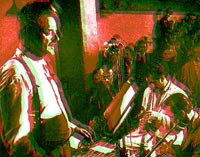|
(for Kerry Tomlinson)
I retrieve a house from the late 1970s, early 80s, in southern California. I made the drive through the meandering roads of Montecito once a week, for three years, to gather with other writers, mostly women, some who became great friends, to be in Kenneth Rexroth's company.
Down the shaded drive of Dower House, past the fragile outdoor furniture, onto the white porch, to be greeted by Ching, the black dog... I enter into the hallway of books, where a student once stole a rare volume on butterflies, and weave my way through the tiny must-filled rooms: Rexroth’s paintings on the walls, a few Gods on the living room mantle, Shiva Nataraj in the dining room. Behind Kenneth’s headboard in his bedroom sits a Tibetan deity, his consort in his lap.
Carol's room is filled with more books, vintage outfits, fabrics, words on a notepad. I step into the bathroom with the tilted floors and the smell of old robes, through the kitchen, past the sticky table, the clutter of open shelving from which hangs a necklace of 10,000 origami birds...down the uncertain back steps to the separate dwelling: a library of fine books, shelved two deep, all subject to mold. Here I sit at the long table with a pot of Jasmine tea, a few hard cookies, and wait for the mocking bird that mimics the sound of Kenneth's manual typewriter.
Starting down the drive again, yet this time Kenneth greets me at the door, his eyelids half lowered, his belly round and sashed; he crushes me for a moment. Then calls out to his wife, Carol, and shuffles into the living room. He tells me he broke his Achilles tendons once. He takes the easy chair in the far corner of the living room, the one with the worn velvet. Students arrive with small things to nibble on, a bottle of wine to drink. Carol brings out plums. Kenneth tells a story about a writer who irritates him, an ex-wife who stole a raft out of a department store, a mother who collected leaf and flower samples with him, pressed them into books. He freights his culture. He has a great admiration for jazz musicians. He reads something from H.D. We read our raw poetry, he shares a love poem by Marichiko.
I head down the drive, only now the house has been renovated, the prayers and smells and clutter driven out. Someone I do not know comes out to the expanded porch. I’m unable to explain my presence and I put the car in reverse. I drive over to the cemetery, the one on the bluff, far above a nude beach. It always takes a while to find the pale granite tablet. I have to look for the pyramid mausoleum first. I sit down next to Kenneth, we talk for a while, and then I just listen.
Without me you can only
Live at random like
A falling pachinko ball.
I am your wisdom.*
|

